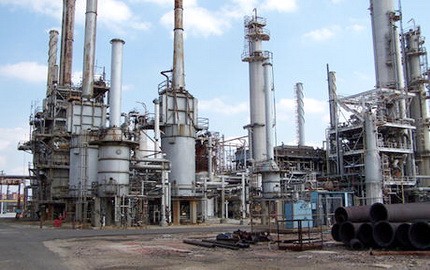The Atuabo Gas Processing Plant has finally been completed after the successful hydro-testing of the pipelines from offshore to the facility last Monday.
The facility, which has the capacity to generate about 140 million standard cubic feet of natural gas a day, is estimated to save the country more than $500 million annually when it is substituted for light crude oil in the generation of power.
In addition, it will produce more than 70 per cent of the estimated 240,000 tonnes of liquefied petroleum gas (LPG) required annually for domestic use in the country.
The successful hydro-testing confirmed the integrity of the pipelines and it was left to the Jubilee partners to hook the pipes onto the FPSO Kwame Nkrumah’s production platform for gas processing to commence.
This was made known by Dr George Adjah-Sipa Yankey, the Chief Executive Officer of the Ghana National Gas Company (Ghana Gas), owners and operators of the facility, when select chiefs and officials from the Western Regional House of Chiefs toured the plant last Tuesday.
The chiefs included Osagyefo Kwamena Enimil VI, the Omanhene of the Wassa Fiase Traditional Area and President of the house; Awulae Attibrukusu III, the Omanhene of Lower Axim and Vice-President of the National House of Chiefs; Nana Kwesi Agyeman IX, the Omanhene of Lower Discove and Vice President of the Western Regional House of Chiefs, and Awulae Agyefi Kwame II, the Omanhene of the Nsein Traditional Area.
Others were Okogyeman Kwaku Gyamprah III, the Omanhene of Sefwi Chirano and member of the Council of State; Ogye Ahoho Yaw Gyebi II, the Omanhene of Sefwi Ahwiaso; Osabarima Kwaw Entsie II, the Omanhen of the Mporhor Traditional Area, and Nana Kobina Nketsiah V, the Omanhen of Essikado.
Dr Yankey said Ghana Gas was undergoing a pre-commissioning exercise to accept gas for processing and onward transmission to the Volta River Authority’s (VRA’s) Thermal Plant at Aboadze for power generation.
The VRA is presently installing facilities at its Aboadze plant to enable it to receive gas from Atuabo.
Dr Yankey said to ensure a shorter commissioning period, engineers had carried out a series of commissions of some areas to reduce the uncertainties involved in the integrated commissioning of the entire system.
Lines to Aboadze
He said although the pipes travelled over 111 kilometres through many communities and districts to the Aboadze Plant, safety measures had been taken to ensure that those communities were well protected.
According to him, to ensure the safety of the pipes, surveillance checks had been put in place to protect the entire right of way.
Dr Yankey said Ghana Gas had also included members of the various communities where the pipelines passed to help protect the lines, while community relations officers would always be available to ensure the safety of the lines.
The Leader of the delegation, Osagyefo Enimil, commended Ghana Gas for the project and urged the company to make the nation and the Western Region proud.
He said owing to the nature and prospects of the project, the chiefs got actively involved in the process and lent a helping hand as and when necessary to ensure its successful completion.
He urged the company to ensure high maintenance of the facility and also involve Ghanaians in its operations.
The chiefs were taken through the entire facility, including the shore inlet and outlet, the processing process, the loading gantry, the flare, the spherical LPG storage facility, as well as safety and control systems.
Proven gas reserve
Ghana is said to have a proven gas reserve of more than five trillion standard cubic feet (TCF) yet to be tapped.
The Jubilee project, which is currently producing oil offshore Ghana, has associated gas of more than 1.2 trillion TCF, which is ready for Ghana Gas to start processing.
Under the Jubilee project, Ghana is expected to have 200 billion TCF of free gas for processing but subsequent ones will be of economic value to the partners, which would be priced accordingly.
It is expected that other activities offshore will increase the country’s reserve.
Ghana Gas was founded in July 2011 to contribute to Ghana’s rapid industrialisation process by building the infrastructure required for the gathering, processing and delivery of natural gas resources to industry in a safe, cost-effective, responsible and reliable manner.
–
Credit: Daily Graphic


